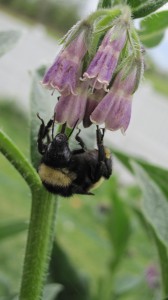We have this plant called comfrey. I think it is quite pretty with little dangling purple flowers on it. Britton thinks it grows too fast and impedes the flow of water from the sprinkler, but I think it’s great! One thing that this plant also does that is unique is it brings bumble bees to our yard. Bumble bees are very different from honey bees. They are big, buzzing, fuzzy and are the classic yellow and black. I happened to be out in the yard and snapped a few pictures of it gathering supplies on the comfrey plant.
Comfrey is actually a useful herb in herbal medicine as well as in fertilizing. The traditional name for it was knitbone as it contains an herbal ingredient allantoin. Allantoin is a cell proliferant that speeds up the natural replacement of body cells. Comfrey was once used to treat a wide variety of ailments ranging from bronchial problems, broken bones, sprains, arthritis, gastric and varicose ulcers, severe burns, acne and other skin conditions. Externally, it has many tremendous benefits as you can see in this video. However, taken internally it should be used in very limited quantities and under careful watch of an herbalist.
Used in the garden, the leaves of comfrey store all of the minerals that the plant accumulates from the soil and can then be composted back into the garden without losing nitrogen. Comfrey has all this and bees beside!



